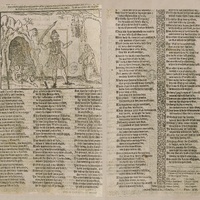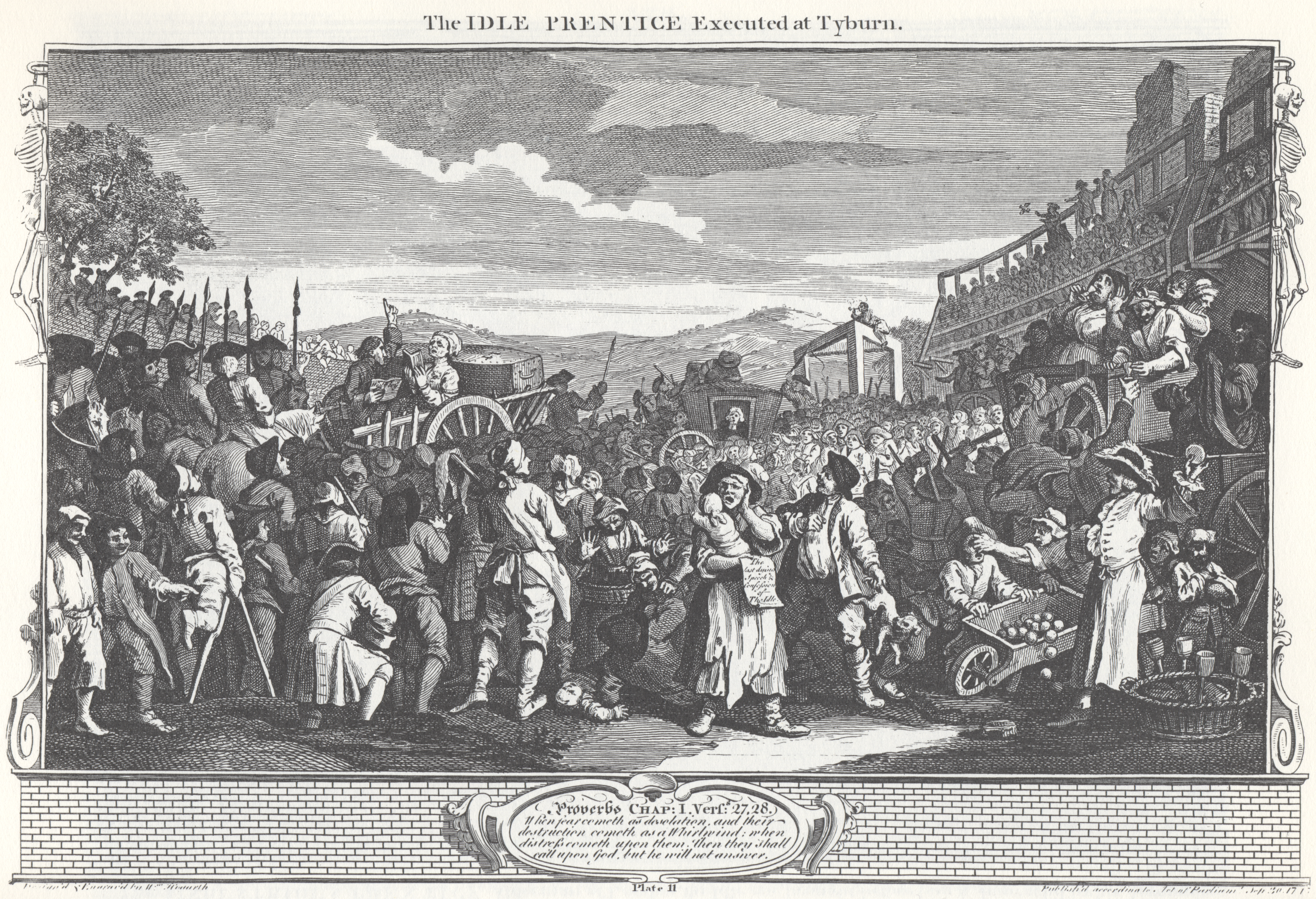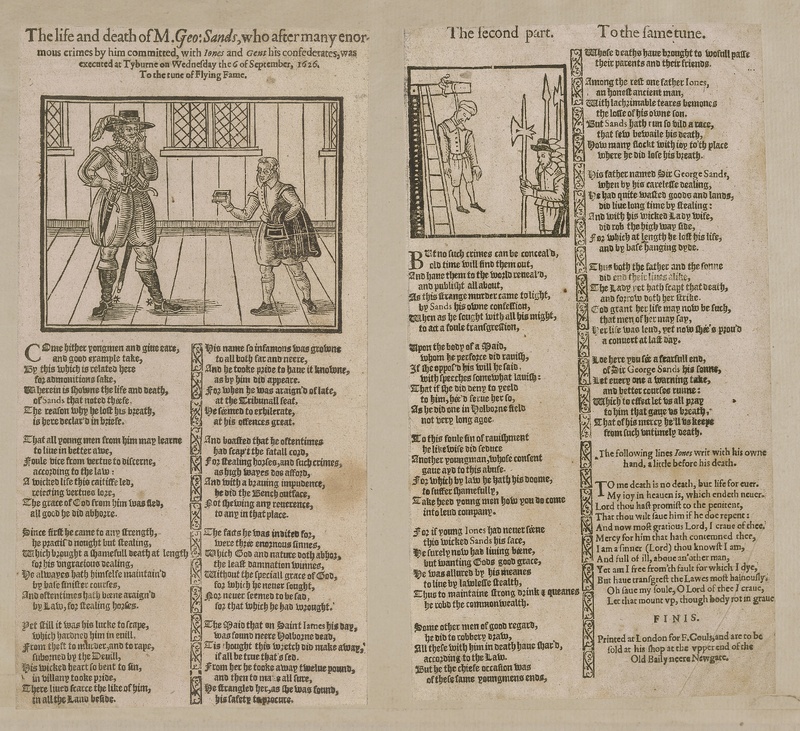The life and death of M. Geo: Sands,
- Ballad Title
- The life and death of M. Geo: Sands,
- Indicated Tune
- Flying Fame
- Ballad Location
- Magdalene College - Pepys Library, Pepys Ballads 1.128-128; EBBA 20055
- Event Date
- 1626
- Event Location
- Tyburn
- Printing Location
- London for F. Couls, and are to be / sold at his shop at the vpper end of the / Old Baily neere Newgate.
- Crime
- murder, rape, sodomy
- Gender of Accused
- Male
- Method of Punishment
- hanging
- Category
- Crime and Punishment Ballads
- Sub-Category
-
 Execution Ballads
Execution Ballads
- Transcription
-
COme hither yongmen and give eare, and good example take,
By this which is related here for admonitions sake,
Wherein is showne the life and death, of Sands that noted theefe.
The reason why he lost his breath, is here declar'd in briefe.
That all young men from him may learne to live in better awe,
Foule vice from vertue to discerne, according to the law:
A wicked life this caitiffe led, rejecting vertues lore,
The grace of God from him was fled, all good he did abhorre.
Since first he came to any strength, he practis'd nought but stealing,
Which brought a shamefull death at length for his ungracious dealing,
He alwayes hath himselfe maintain'd by base sinister courses,
And oftentimes hath beene araign'd by Law, for stealing horses.
Yet still it was his lucke to scape, which hardned him in evill,
From theft to murder, and to rape, suborned by the Devill,
His wicked heart so bent to sin, in villany tooke pride,
There lived scarce the like of him, in all the Land beside.
His name so infamous was growne to all both far and neere,
And he tooke pride to have it knowne, as by him did appeare.
For when he was araign'd of late, at the Tribunall seat,
He seemed to exhilerate, at his offences great.
And boasted that he oftentimes had scap't the fatall cord,
For stealing horses, and such crimes, as high wayes doe afford,
And with a braving impudence, he did the Bench outface,
Not shewing any reverence, to any in that place.
The facts he was indited for, were three enornous sinnes,
Which God and nature doth abhor, the least damnation winnes,
Without the speciall grace of God, for which he never sought,
Nor never seemed to be sad, for that which he had wrought.
The Maid that on Saint James his day, was found neere Holborne dead,
Tis [t]hought this wretch did make away, if all be true that's sed.
From her he tooke away twelve pound, and then to ma[k]e all sure,
He strangled her, as she was found, his safety to procure.
The second part. To the same tune.
BUt no such crimes can be conceal'd, old time will find them out,
And have them to the world reveal'd, and publisht all about,
As this strange murder came to light, by Sands his owne confession,
When as he sought with all his might, to act a foule transgression,
Upon the body of a Maid, whom he perforce did ravish,
If she oppos'd his will he said with speeches somewhat lavish:
That if she did deny to yeeld to him, hee'd serve her so,
As he did one in Holborne field not very long agoe.
To this foule sin of ravishment he likewise did seduce
Another youngman, whose consent gave ayd to this abuse.
For which by law he hath his doome, to suffer shamefully,
Take heed young men how you do come into leud company.
For if young Jones had never seene this wicked Sands his face,
He surely now had living beene, but wanting Gods good grace,
He was allured by his meanes to live by lawlesse stealth,
Thus to maintaine strong drink & queanes he robd the commonwealth.
Some other men of good regard, he did to robbery draw,
All these with him in death have shar'd, according to the Law.
But he the chiefe occasion was of these same youngmens ends,
Whose deaths have brought to wofull passe their parents and their friends.
Among the rest one father Jones, an honest ancient man,
With lachrimable teares bemones the losse of his owne son.
But Sands hath run so [w]ild a race, that few bewaile his death,
How many flockt with joy to'th place where he did lose his breath.
His father named Sir George Sands, when by his carelesse dealing,
He had quite wasted goods and lands, did live long time by stealing:
And with his wicked Lady wife, did rob the high way side,
For which at length he lost his life, and by base hanging dyde.
Thus both the father and the sonne did end their lives alike,
The Lady yet hath scapt that death, and sorrow doth her strike.
God grant her life may now be such, that men of her may say,
Her life was leud, yet now shee's prov'd a convert at last day.
Loe here you see a fearfull end, of Sir George Sands his sonne,
Let every one a warning take, and better courses runne:
Which to effect let us all pray to him that gave us breath,
That of his mercy he'll us keepe
from such untimely death.
The following lines Jones writ with his owne hand, a little before his death.
To me death is not death, but life for ever.
My joy in heaven is, which endeth never.
Lord thou hast promist to the penitent,
That thou wilt save him if he doe repent:
And now most gratious Lord, I crave of thee.
Mercy for him that hath contemned thee,
I am a sinner (Lord) thou knowst I am,
And full of ill, above an'other man,
Yet am I free from'th fault for which I dye,
But have transgrest the Lawes most hainously. Oh save my soule, O Lord of thee I crave, Let that mount up, though body rot in grave.




